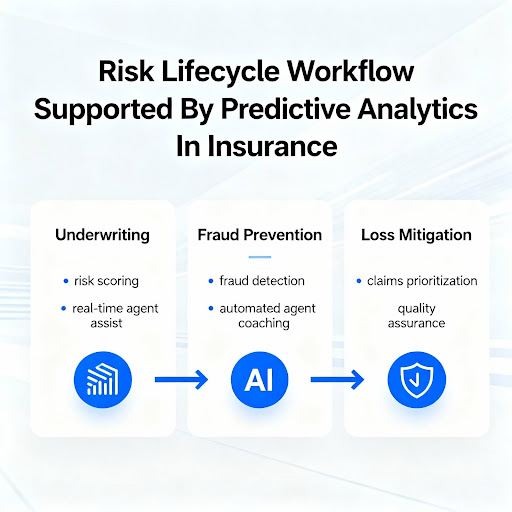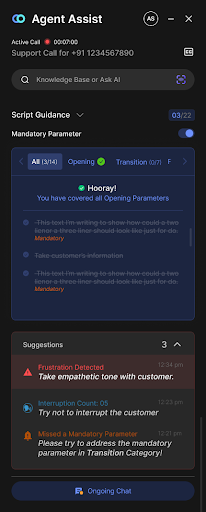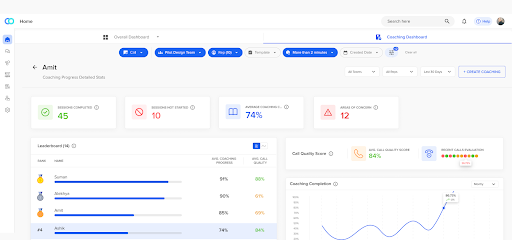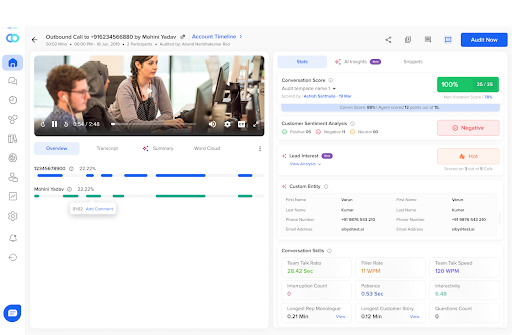Predictive analytics in insurance is revolutionizing the risk management landscape in 2025. By using advanced data analysis and AI, insurers gain deep insights to improve underwriting, fraud detection, and loss mitigation. Convin’s cutting-edge solutions play a critical role in driving smarter risk strategies in today’s competitive insurance market.
Predictive analytics in insurance uses data and AI to forecast risks, improve underwriting, detect fraud, and enhance claims management, enabling insurers to make smarter, more accurate, and efficient risk decisions.
Start using Convin’s AI to win at insurance underwriting!
What Is Predictive Analytics In Insurance And Why Is It Crucial For 2025?
Predictive analytics in insurance applies machine learning and statistical models to forecast future risks, claims, and customer behavior accurately.
This method helps insurers transform traditional risk processes into data-driven decisions, enhancing profitability and responsiveness.
Convin supports insurers with innovative tools that bring predictive insights into everyday workflows for measurable impact.
Understanding The Basics Of Predictive Analytics In Insurance
Predictive analytics in insurance leverages historical and real-time data to forecast future outcomes with precision.
By analyzing large datasets, insurers can detect patterns that reveal potential risks, customer behavior, and claim probabilities.
This technology enables proactive risk management and decision-making, moving away from traditional reactive approaches.
Key components include data mining, machine learning, and statistical modeling, which work together to provide actionable insights.
- Detects risk patterns from vast historical insurance data.
- Predicts claim likelihood, severity, and fraud with high accuracy.
- Supports personalized underwriting and targeted fraud prevention.
- Enhances operational efficiency by automating risk assessments.
Convin’s solutions capitalize on these analytics to accelerate smart insurance decisions.

Risk Lifecycle Workflow Supported By Predictive Analytics In Insurance
- Underwriting: Evaluate applicant risk using insurance predictive analytics and Convin’s real-time agent assist.
- Fraud Prevention: Detect suspicious patterns early with predictive analytics and automated coaching.
- Loss Mitigation: Prioritize high-risk claims and enforce quality using data analytics and quality assurance tools.
- Policyholder Engagement: Use data to personalize interactions and resolve claims swiftly.
Adopting predictive analytics in insurance with Convin’s tools ensures operational excellence and a competitive advantage in 2025.
Overview Of Convin’s Role In Enhancing Predictive Analytics
Convin revolutionizes predictive analytics in insurance by delivering AI-powered tools that streamline risk assessment and decision-making.
Convin’s real-time agent assist empowers underwriters and agents with instant, data-driven insights, accelerating accurate risk evaluation.
With automated agent coaching, Convin ensures continuous skill enhancement, while automated quality assurance maintains high standards consistently.
- Real-time data delivery for faster decisions
- AI-driven coaching to improve agent accuracy
- Automated quality checks for compliance and consistency
Convin’s innovative solutions transform predictive analytics into actionable intelligence, driving smarter risk strategies.
Predictive analytics in insurance forms the foundation of smarter risk strategies, setting the stage for enhanced underwriting, fraud prevention, and loss mitigation.
Unlock smarter insurance decisions with Convin!
How Does Predictive Analytics Improve Underwriting Predictive Analytics?
Underwriting predictive analytics optimizes risk selection and pricing through data-driven insights. It reduces manual effort and errors, enabling underwriters to focus on complex cases.
Predictive analytics in insurance enhances profitability, customer satisfaction, and compliance.
The Role Of Insurance Predictive Analytics In Underwriting
Insurance predictive analytics plays a transformative role in underwriting by providing precise, data-driven insights that enhance risk evaluation.
- Traditional underwriting often relies on manual judgment and static data, but predictive analytics in insurance enables a dynamic, real-time understanding of applicant risk profiles.
By analyzing vast amounts of data, from medical history to behavioral patterns, insurers can predict the probability of claims more accurately. This results in better risk selection, pricing, and improved profitability.
Key benefits include:
- Rapid sorting and prioritization of applications based on risk scores
- Enhanced accuracy in life insurance underwriting decisions
- Alignment of policies with individual risk appetite
- Reduction of underwriting errors and manual workload
Predictive analytics in insurance empowers underwriters to make smarter, faster decisions, driving competitive advantage and improved customer outcomes.

Features Of Convin’s Real-Time Agent Assist In Underwriting
Convin’s real-time agent assist is a game-changer for underwriting teams, providing instant access to critical data and actionable insights during risk assessment.
- Real-time agent assist is an AI-powered tool that analyzes incoming applications, highlights key risk factors, and suggests optimal underwriting decisions on the spot.
It reduces manual effort, accelerates processing times, and improves accuracy by enabling underwriters to make well-informed choices quickly.
Key features include:
- Instant risk scoring based on comprehensive data analytics
- Alerts for potential underwriting red flags in real time
- Seamless integration with existing underwriting workflows
- AI-driven recommendations tailored for life insurance underwriting
- Enhanced collaboration between agents and underwriters for efficient decision-making
By leveraging Convin’s real-time agent assist, insurers enhance underwriting efficiency and accuracy, boosting overall profitability.
The underwriting lifecycle with predictive analytics ensures a robust risk selection process, setting up insurers for downstream success.
Level up insurance losses control with Convin’s smart tools!
This blog is just the start.
Unlock the power of Convin’s AI with a live demo.

What Role Does Predictive Analytics In Insurance Play In Fraud Prevention?
Fraud substantially impacts insurer losses; predictive analytics in insurance strengthens fraud detection and prevention. It identifies suspicious claims earlier, reducing false positives and investigation costs.
Role Of Predictive Analytics In Insurance Fraud Prevention
Predictive analytics in insurance plays a crucial role in detecting and preventing fraud before it causes significant financial damage.
- By leveraging historical claims data and advanced machine learning algorithms, predictive models identify patterns and anomalies that suggest fraudulent behavior.
- This allows insurers to focus investigative resources on high-risk cases, enhancing efficiency and reducing losses.
Predictive analytics also continuously learns from new data, improving fraud detection accuracy over time.
Key functions include:
- Automated identification of suspicious claims through behavioral and data pattern analysis
- Early flagging of potential insurance claims fraud detection to speed investigations
- Reduction of false positives, minimizing unnecessary claim reviews
- Enhanced compliance with anti-fraud regulations and internal policies
- Continuous improvement through adaptive learning from emerging fraud tactics
Integrating predictive analytics in insurance strengthens fraud prevention and protects insurer assets effectively.

How Convin’s Automated Agent Coaching Supports Fraud Detection
Convin’s automated agent coaching significantly enhances fraud detection by continuously training contact center agents to recognize and respond to suspicious activities.
- The AI-driven coaching system analyzes calls and interactions in real time, providing immediate feedback and guidance to improve agent performance.
This proactive approach helps agents identify potential fraud signals more accurately and consistently.
Key benefits include:
- Real-time alerts for potential fraud indicators during calls
- Personalized coaching that adapts to individual agent strengths and weaknesses
- Continuous performance monitoring to reinforce compliance and best practices
- Reduction in missed fraud cases and false alarms
Convin’s automated coaching ensures stronger fraud prevention through smarter, well-trained agents.
Integrating fraud prevention into the risk lifecycle using predictive analytics enables insurers to minimize losses while maintaining efficiency.
Detect fraud faster with Convin’s predictive analytics tools!
How Is Risk Predictive Analytics Insurance Applied In Loss Mitigation?
Risk predictive analytics insurance reduces claims costs through early detection and intervention. Analyzing risk enables better resource allocation for claims management and customer outreach.
Insurance Data Analytics For Proactive Loss Reduction
Insurance data analytics plays a critical role in proactively reducing losses by identifying high-risk claims early in the process.
- By analyzing diverse data sources, insurers can forecast claim severity and potential costly outcomes before they escalate.
- This enables focus on prioritized claims and timely interventions to mitigate financial impact.
Predictive analytics in insurance empowers insurers to allocate resources efficiently and improve overall loss management.
Key aspects include:
- Early detection of claims likely to incur high costs
- Identification of risk factors contributing to losses
- Prioritization of claims for faster resolution
- Data-driven strategies for loss prevention and control
- Continuous monitoring to adapt to emerging risk trends
Proactive loss reduction improves insurer profitability and customer satisfaction.

Product Use In Automated Quality Assurance And Agent Coaching
Convin’s products enhance insurance risk management through automated quality assurance and agent coaching.
- Automated quality assurance continuously evaluates agent interactions and claims processes to ensure adherence to compliance and operational standards.
- This reduces errors and maintains high service quality.
- Automated agent coaching delivers personalized, real-time feedback to agents, helping them improve skills and accuracy in handling complex claims and loss mitigation cases.
Key advantages include:
- Consistent monitoring of agent performance for compliance
- Instant coaching tailored to specific agent needs
- Improved accuracy and efficiency in claims handling
- Faster agent learning and skill development
- Enhanced customer experience through better service quality
These tools empower insurers to optimize workflows and reduce losses effectively.
Applying predictive analytics in insurance at the loss mitigation stage strengthens overall risk control and cost efficiency.
Make risk decisions easier with Convin’s real-time agent assist!
How Can Insurers Boost Policyholder Satisfaction Using Predictive Analytics In Insurance?
Predictive analytics improves policyholder satisfaction by enabling personalized service and rapid claims resolution. Using data insights, insurers can better anticipate customer needs and prevent pain points.
Convin’s Industry Solution For Policyholder Satisfaction
Convin’s industry solution focuses on boosting policyholder satisfaction by leveraging predictive analytics and AI-driven insights.
The platform continuously monitors policyholder interactions, claims, and feedback to identify improvement areas proactively.
This enables insurers to tailor their services and communication to individual policyholder needs, creating a personalized experience that enhances loyalty and retention.
Key features include:
- Real-time analysis of policyholder behavior and sentiment
- Predictive insights to anticipate and resolve claims issues early
- Personalized communication strategies based on data-driven profiles
- Automation that accelerates claims processing and service delivery
- Continuous improvement driven by AI-powered feedback loops
Convin’s solution empowers insurers to deliver exceptional service and strengthen customer relationships effectively.
Predictive analytics in insurance is revolutionizing the risk management landscape in 2025. By using advanced data analysis and AI, insurers gain deep insights to improve underwriting, fraud detection, and loss mitigation.
Convin’s cutting-edge solutions play a critical role in driving smarter risk strategies in today’s competitive insurance market.
Using Predictive Analytics To Improve Claims And Service
Predictive analytics in insurance significantly improves claims processing and customer service by anticipating issues and enabling proactive intervention.
- It analyzes data to predict claim complexities, potential delays, or disputes, allowing insurers to address problems before they escalate.
This results in faster, more accurate claims resolution and a better overall policyholder experience.
Key advantages include:
- Early identification of high-risk or complex claims
- Proactive outreach to resolve potential disputes swiftly
- Improved accuracy in claim settlements through data insights
- Enhanced transparency fostering trust and loyalty
- Streamlined workflows, reducing processing times and errors
By leveraging predictive analytics in insurance, insurers can deliver faster, more personalized, and efficient claims service.
Enhanced customer satisfaction results when predictive analytics in insurance aligns service delivery with individual needs through data-driven decisions.
Key Takeaway On Predictive Analytics In Insurance’s Impact On Risk Management
Predictive analytics in insurance transforms risk management by enhancing underwriting, fraud prevention, and loss mitigation with data-driven insights. It enables insurers to make faster, more accurate decisions, improving profitability and operational efficiency while minimizing risks.
Convin’s AI-powered products deliver real-time assistance, automated coaching, and quality assurance. Together, they empower insurers to implement smarter, proactive risk strategies that boost customer satisfaction and maintain competitive advantage in 2025 and beyond.
Book your Convin demo today!
FAQs
- How accurate are predictive analytics in insurance models for risk assessment?
Predictive analytics in insurance models achieve high accuracy by analyzing vast data and learning from patterns. Continuous model updates improve precision, helping insurers make reliable risk assessments and reduce errors effectively.
- What training do insurance agents need for predictive analytics in insurance tools?
Agents require training in data interpretation, AI tool usage, and understanding predictive insights. Focus on continuous learning through automated coaching ensures agents apply analytics effectively to improve decision-making and customer interactions.
- Can small insurance companies afford predictive analytics in insurance solutions?
Yes, scalable and cloud-based predictive analytics solutions make it affordable for small insurers. These options reduce upfront costs, offer flexibility, and provide competitive advantages through data-driven risk management without heavy infrastructure investments.
- What are the privacy concerns with predictive analytics in insurance data usage?
Privacy concerns include data protection, consent, and potential misuse. Insurers must comply with regulations, implement strong security measures, and ensure transparent data handling to protect policyholder information and maintain trust.
- How does predictive analytics in insurance compare to traditional risk assessment methods?
Predictive analytics in insurance offers real-time, data-driven insights, unlike traditional static assessments. It improves accuracy, speeds decisions, and adapts to emerging risks, providing a more proactive and dynamic risk evaluation approach.


.webp)




.avif)